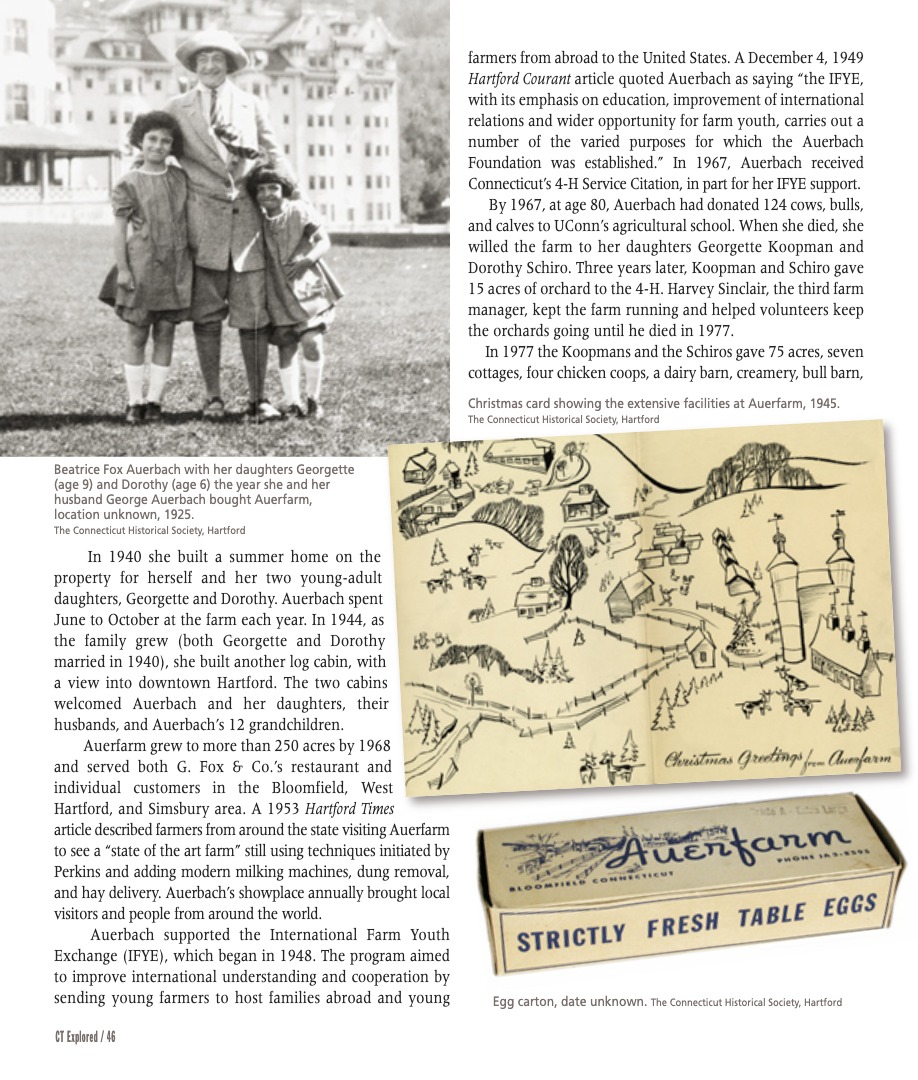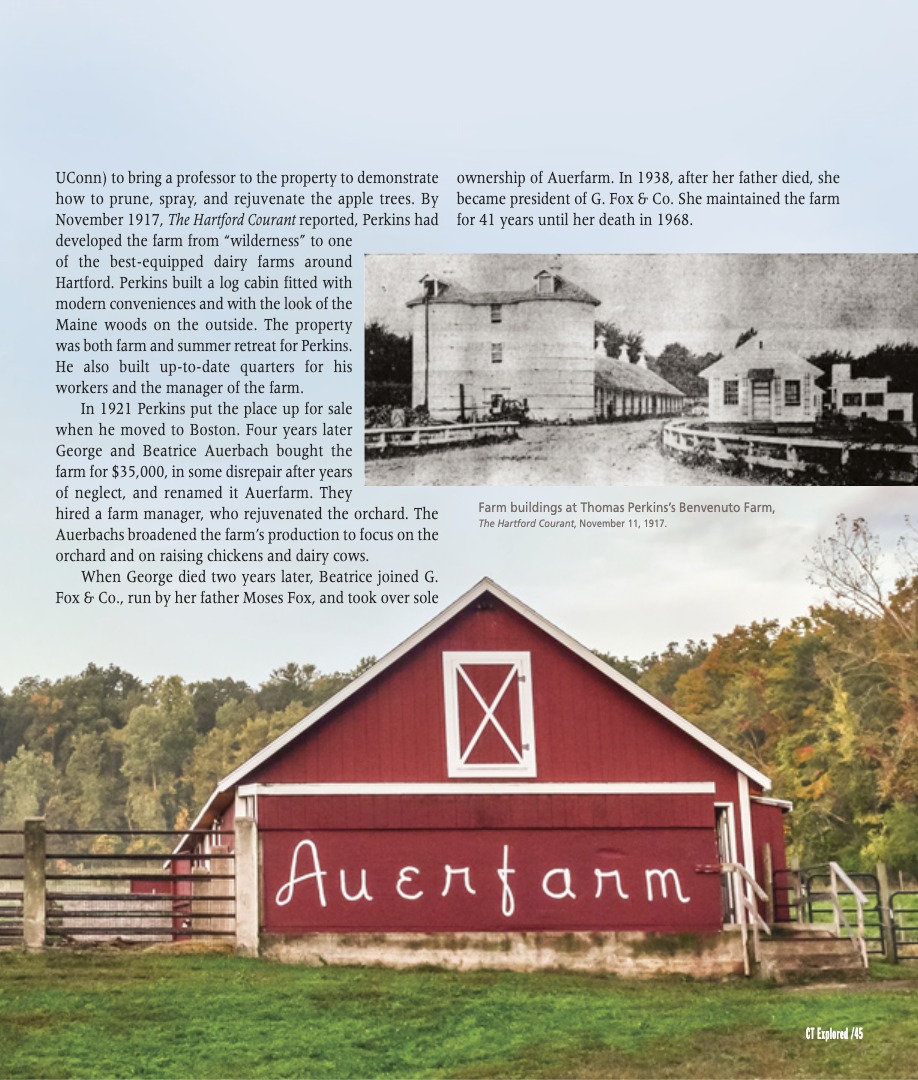(c) Connecticut Explored Inc. Summer 2020
Subscribe/Buy the Issue!
Beatrice Fox Auerbach (1889 – 1968) left a legacy in the Hartford area: her family, the example and impact of her business acumen in leading G. Fox & Co., her civic engagement, her work in building women’s leadership, her support of human rights, her desire to bring the world to Hartford—and Auerfarm.
Auerbach and husband George Auerbach bought Auerfarm in 1925 to grow a modern farm and a family retreat. They wanted to show that farming could be “modern” with tiled barn walls, focus on cleanliness, and use of modern business techniques. In 1970 Auerfarm became a nonprofit organization whose mission was to champion education within a farm setting. Today, the farm continues to inspire children and adults to engage in, learn about, and enjoy agriculture, science, and the natural environment.
In 1910 Thomas Perkins of Hartford bought this 230-acre Bloomfield property for $15,000. Several failed farms on the property left the land in near wilderness. At a time when farmers were selling their land to suburban developers, he hoped to make it a model dairy farm. He wanted to show that a “balanced farm,” not dependent on just one crop, could be successful. He also introduced “intelligent bookkeeping” and efficiencies that in theory could deliver both a profit and satisfaction to the farmer, according to a November 11, 1917 Hartford Courantarticle.
Perkins developed the property’s existing orchard by adding 37 varieties of apple trees. In 1912 Perkins established a partnership with the Connecticut Agricultural College (now UConn) to bring a professor to the property to demonstrate how to prune, spray, and rejuvenate the apple trees. By November 1917, The Hartford Courant reported, Perkins had developed the farm from “wilderness” to one of the best-equipped dairy farms around Hartford. Perkins built a log cabin fitted with modern conveniences and with the look of the Maine woods on the outside. The property was both farm and summer retreat for Perkins. He also built up-to-date quarters for his workers and the manager of the farm.
In 1921 Perkins put the place up for sale when he moved to Boston. Four years later George and Beatrice Auerbach bought the farm for $35,000, in some disrepair after years of neglect, and renamed it Auerfarm. They hired a farm manager who rejuvenated the orchard. The Auerbachs broadened the farm’s production to focus on the orchard and on raising chickens and dairy cows.
When George died two years later, Beatrice joined G. Fox & Co., run by her father Moses Fox, and took over sole ownership of Auerfarm. In 1938, after her father died, she became president of G. Fox & Co. She maintained the farm for 41 years until her death in 1968.
In 1940 she built a summer home on the property for herself and her two young-adult daughters, Georgette and Dorothy. Auerbach spent June to October at the farm each year. In 1944, as the family grew (both Georgette and Dorothy married in 1940), she built another log cabin, with a view into downtown Hartford. The two cabins welcomed Auerbach and her daughters, their husbands, and Auerbach’s 12 grandchildren.
 Auerfarm grew to more than 250 acres by 1968 and served both G. Fox & Co.’s restaurant and individual customers in the Bloomfield, West Hartford, and Simsbury area. A 1953 Hartford Times article described farmers from around the state visiting Auerfarm to see a “state of the art farm” still using techniques initiated by Perkins and adding modern milking machines, dung removal, and hay delivery. Auerbach’s showplace annually brought local visitors and people from around the world.
Auerfarm grew to more than 250 acres by 1968 and served both G. Fox & Co.’s restaurant and individual customers in the Bloomfield, West Hartford, and Simsbury area. A 1953 Hartford Times article described farmers from around the state visiting Auerfarm to see a “state of the art farm” still using techniques initiated by Perkins and adding modern milking machines, dung removal, and hay delivery. Auerbach’s showplace annually brought local visitors and people from around the world.
Auerbach supported the International Farm Youth Exchange (IFYE), which began in 1948. The program aimed to improve international understanding and cooperation by sending young farmers to host families abroad and young farmers from abroad to the United States. A December 4, 1949 Hartford Courant article quoted Auerbach as saying “the IFYE, with its emphasis on education, improvement of international relations and wider opportunity for farm youth, carries out a number of the varied purposes for which the Auerbach Foundation was established.” In 1967, Auerbach received Connecticut’s 4-H Service Citation, in part for her IFYE support.
By 1967, at age 80, Auerbach donated 124 cows, bulls, and calves to UConn’s agricultural school. When she died, she willed the farm to her daughters Georgette Koopman and Dorothy Schiro. Three years later, Koopman and Schiro gave 15 acres of orchard to the 4-H. Harvey Sinclair, the third farm manager, kept the farm running and helped volunteers keep the orchards going until he died in 1977.
In 1977 the Koopmans and the Schiros gave 75 acres, seven cottages, four chicken coops, a dairy barn, creamery, bull barn, and a small office to the new Connecticut 4-H Development Fund, Inc., a non-profit education organization, affiliated with the Connecticut Cooperative Extension. UConn, through the Cooperative Extension, hired the workers, and Nancy Weiss became the first assistant director of 4-H and youth programs. The Cooperative Extension employees hoped that Auerfarm would be a center for environmental education and a conference center, with the support of UConn’s Ag School. In 1978, eight workers in the CETA (Comprehensive Employment and Training Act) program under the supervision of Carl Salsedo, Hartford County agricultural agent, helped keep the farm running and the 25 buildings in good repair. In 1980, according to The Hartford Courant (July 28, 1980), the farm grew 35 acres of hay, 35 acres of oats, and 3 acres of vegetables. It also had a few dairy heifers and sheep.
According to Weiss, Bull, and Rideout in a 2011 UConn publication about the history of the Cooperative Extension, the Auerbach Farm Education Center was dedicated in 1978 to provide agriculture-based educational programming for children. These women all volunteered at the farm for the last decades of the 20th century.
From the 1990s into the 2000s, part-time director Beth Salsedo, part-time farm teachers, the volunteer board, and volunteers, kept the farm going. Until 2012, UConn financially supported the staff at the farm, but when that support ended, they were left to raise funds, some of which came from the Koopman and Schiro families.
The Cooperative Extension’s Master Gardeners program began growing food for Foodshare in 2002, raising up to two tons of food per year, according to the UConn Extension website.
In 2009 a Hartford Foundation for Public Giving fund endowed by Beatrice Auerbach gave the Connecticut 4-H Development Fund, Inc. $68,000 to convert the creamery and the stock barn into classrooms. The board also received a $600,000 state grant to convert the dairy barn into classroom and office space. But it wasn’t until the board hired full-time Executive Director Jack Hasegawa in 2011 and secured $700,000 of state bond money in 2015 that the conversion of the dairy barn to classrooms project happened.
Money from the State Department of Agriculture funded construction of a new barn for the farm animals in 2015. During Hasegawa’s tenure, and with the advocacy of long-time board member Pat Estill, the farm began a collaboration with Bloomfield’s Wintonbury Early Learning Magnet School. These pre-school students visit the farm 12 times each school year. Since 2009, Hartford’s Annie Fisher Upper Elementary Montessori School students have spent one week per month at the farm.
In 2015 Beth Schiro, one of Auerbach’s grandchildren, donated 40 acres—including part of the orchard, the two summer homes, apple barn, and a boarding house—to create Auerfarm State Park and Scenic Preserve. The state, per the terms of the gift, razed the buildings and plans to build an infrastructure that enables more people to enjoy the vistas of Cider Hill.
By 2015, more than 14,000 student visits took place each year. The Auerfarm board hired Beth Bye to succeed Hasegawa in 2016. In her three years at Auerfarm, she initiated Farm Explorers, to bring local pre-school and kindergarten classes to the farm. With support from the Richard P. Garmany Fund at the Hartford Foundation and the Koopman Fund, the organization refurbished the rental houses and road. Bye established a partnership with the West Hartford Public Schools post-secondary program for students with disabilities to build a greenhouse for a hands-on farming experience. Bye also negotiated a partnership with Healing Meals, a nonprofit that grows, prepares, and delivers organic meals for families facing serious health crises. Healing Meals planted its own gardens and has teen volunteers garden, prepare, and cook food and work in a cross-generational kitchen.
Auerfarm, funded by private contributions, grants, public-school visit fees, and partnerships, continues to welcome people to learn where food comes from and to be with nature. Visitors today might echo the words of a 1941 visitor and friend of Beatrice Auerbach, Hannah Haas, who wrote in Auerfarm’s guest book, “We always shout ‘Hip, Hip, Hooray’ when we are invited out to Auerfarm. May we shout often.” The non-profit, aided by volunteers, a supportive community and a lot of love continues to give people of all ages the chance to learn within a farm setting.
Tracey Wilson is West Hartford’s Town Historian. She has done extensive research on Beatrice Fox Auerbach. She is married to Beth Bye. She last wrote “How Segregation Happened in West Hartford,” Summer 2019
Explore!
“Hebrew Tillers of the Soil,” Spring 2006
“The Handkerchief Brigade,” Fall 2015

